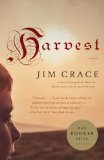Summary | Excerpt | Reviews | Beyond the Book | Readalikes | Genres & Themes | Author Bio

1
Two twists of smoke at a time of year too warm for cottage fires surprise us at first light, or they at least surprise those of us who've not been up to mischief in the dark. Our land is topped and tailed with flames. Beyond the frontier ditches of our fields and in the shelter of our woods, on common ground, where yesterday there wasn't anyone who could give rise to smoke, some newcomers, by the luster of an obliging reapers' moon, have put up their hut— four rough and ready walls, a bit of roof— and lit the more outlying of these fires. Their fire is damp. They will have thrown on wet greenery in order to procure the blackest plume, and thereby not be missed by us. It rises in a column that hardly bends or thins until it clears the canopies. It says, New neighbors have arrived; they've built a place; they've laid a hearth; they know the custom and the law. This first smoke has given them the right to stay. We'll see.
But it is the second twist of gray that calls us close, that has us rushing early from our homes on this rest day toward Master Kent's house. From a distance this smoke is pale. No one has added greenery to darken it. But the blaze itself is less faint- hearted. It is rackety. It is a timber fire, for sure. But ancient wood. Long- felled. The years are in its smell. We fear it is the manor house that burns and that we will be blamed for sleeping through. We'd best prepare excuses now. So, if we heard the cracking of its rafters and its beams in our slumbers this morning, we must have mistaken it for the usual busying of trees and wind, or for the toiling of dreams, or for the groaning of our bones. Yesterday was harvest end, the final sheaf. We were expecting to sleep long and late this morning, with heavy shoulders naturally but with buoyant hearts. Our happiness has deafened us, we'll say. It was only when we heard Willowjack, the master's fancy sorrel mare, protesting at the smoke with such alarm, that we awoke and went to help, as help we must, for no one wants to lose the manor house.
Now that we have reached our master's paddocks and his garths, we can smell and taste the straw. The smoke and flames are coming not from his home but from his hay lofts and his stable roofs. His pretty, painted dovecote has already gone. We expect to spot his home- birds' snowy wings against the smoke- gray sky. But there are none.
I know at once whom we should blame. When Christopher and Thomas Derby, our only twins, and Brooker Higgs came back from wooding last evening, they seemed a little too well satisfied, but they weren't bringing with them any fowl or rabbit for the pot, or even any fuel. Their only spoils, so far as I could tell, were a bulky, almost weightless sack and immodest fits of laughter. They'd been mushrooming. And by the looks of them they had already eaten raw some of the fairy caps they'd found. I did the same myself in my first summer of settlement here, a dozen or so years ago, when I was greener and less timid, though not young. I remember eating them. They are beyond forgetting. Just as yesterday, the last sheaf of that year's harvest had been cut and stood. And, just as today, we'd faced a break from labor, which meant that I could sleep my mischief off. So in the company of John Carr, my new neighbor then, my neighbor still, I went off that afternoon to Thank the Lord for His Munificence by hunting fairy caps in these same woods. I'll not forget the dancing lights, the rippling and the merriment, the halos and the melting trails that followed anything that moved, the enormous fearlessness I felt, the lasting fear (yes, even now), or how darkly blue the moon became that night, and then how red. I wish I'd had the courage since to try to find that moon again.
Last evening, when the twins and Brooker Higgs jaunted past our cottages and waved at us with gill stains on their fingertips, I asked these merry men, "Had any luck?" They bared their sack of spoils at once, because they were too foxed and stupefied to conceal them, even though they understood my ancient closeness to the manor house. I pulled aside the dampening of leaves and inspected their few remaining fairy caps, saved for later revels, I suppose, plus a good number of golden shawls, which, stewed in milk and placed inside a dead man's mouth, are meant to taste so good they'll jolt him back to life. Accounting for the bulk of their sack was a giant moonball, its soft, kid- leather skin already smoking spores, and far too yellowy and dry to cook. Why had they picked it, then? Why hadn't they just given it a satisfying kick? What kind of wayward lads were these?
Excerpted from Harvest by Jim Crace. Copyright © 2013 by Jim Crace. Excerpted by permission of Nan A. Talese. All rights reserved. No part of this excerpt may be reproduced or reprinted without permission in writing from the publisher.
Your guide toexceptional books
BookBrowse seeks out and recommends the best in contemporary fiction and nonfiction—books that not only engage and entertain but also deepen our understanding of ourselves and the world around us.